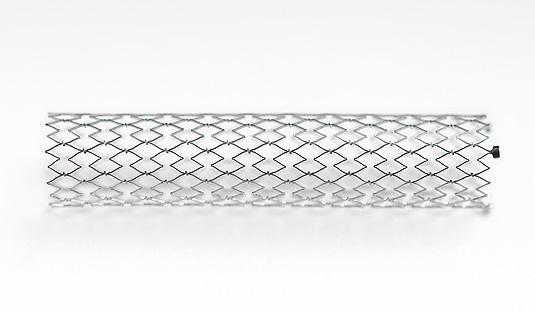January 6, 2014 — Stentys, developer of the world's first self-apposing
stent to treat acute myocardial infarction (AMI), announced new data in indications outside of myocardial infarction. Results from the OPEN II
study and a series from the Amsterdam Medical Center were presented during the TCT conference (TCT 2013) in San Francisco.
OPEN II is a prospective, single-arm trial that enrolled 217 patients treated for chest pain due to a narrowing at a coronary artery bifurcation with the Stentys paclitaxel-eluting stent in 21 hospitals in six European countries. The primary endpoint of MACE (composite of cardiac death, myocardial infarction, emergent bypass surgery and target lesion revascularization) at six months was 10.1 percent for the whole study group, with a rate of 6.9 percent in patients with simple lesions. Christoph Naber, M.D., Ph.D., Contilia Heart and Vascular Center, Essen, Germany, and principal investigator of the study, presented the results.
“This large study in a highly complex group of patients with challenging lesions confirms that the Stentys stent can be used in routine practice and leads to very good results compared to those published historically,” said Naber.
Huangling Lu, M.D., from Amsterdam Medical Center, Netherlands, also presented a series of 87 patients treated with Stentys at her institution. This series enrolled primarily patients with atypical anatomy: 53 percent had aneurysmatic or ectactic vessels, 31 percent had tapered vessels, 23 percent had large vessels (above 4.5 mm) and 10 percent had bypass grafts. At 12 months, the MACE rate was 4.7 percent.
“The Self-Apposing stent is the only available product that can conform to complex, non-cylindrical vessel anatomy, as detailed on its recently extended CE mark label,” said Gonzague Issenmann, CEO and co-founder, Stentys.
The Stentys Self-Apposing stent is engineered to solve the dilemma of artery diameter discrepancy. Its flexible, self-expanding design takes the shape of the patient’s unique vessel anatomy and apposes to the irregular contours of a blood vessel.
For more information: www.stentys.com


